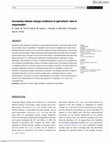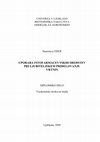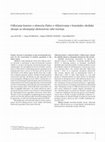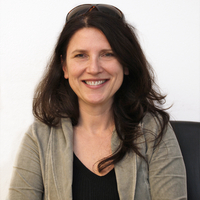Papers by Majda Černič Istenič

Agriculture and Human Values, 2024
The challenges of work-life balance, gender equality in work and family life, and changing social... more The challenges of work-life balance, gender equality in work and family life, and changing social norms-responsible parenthood and safe and healthy working conditions-have been widely discussed and addressed in literature, policy documents, and the media for decades. Since the early days of rural studies, the family farm has been widely recognized as a special unit of production, consumption, and lifestyle. However, the lifestyle of family farms, including work-life balance, has received little attention or consideration in policy and academic debates, particularly in Europe. Based on these observations, this paper discusses the results of two consecutive studies on working conditions on farms in Slovenia, with a focus on worklife balance in the case of maternity/parental leave on farms. The first study is based on structured interviews with 60 adult members of family farms of both genders conducted in 2018/2019, and the second study is based on semi-structured interviews with 23 farmers of both genders from different parts of the country, conducted in 2021/2022. The stories of the two groups of research participants are assessed and discussed against the background of the current scholarly debate on work-life balance in farming context and the recently adopted institutional framework for work-life balance in the European Union.
Zenodo (CERN European Organization for Nuclear Research), Mar 31, 2023
Journal of European Social Policy, Aug 1, 1998
are non-existent. The UK is another interesting case, in so far as the early 1990s saw a revival ... more are non-existent. The UK is another interesting case, in so far as the early 1990s saw a revival of the male-breadwinner model strictu sensu, that is the enforcement of fathers’ economic responsibilities towards their children and their children’s mother, irrespective of the relationships with the latter and making state support conditional on the naming of the father. The Scandinavian countries have also
Zenodo (CERN European Organization for Nuclear Research), Oct 25, 2022

Water Science & Technology: Water Supply, Jan 18, 2019
Achieving climate change (CC) resilience in a timely and efficient fashion is becoming a major pr... more Achieving climate change (CC) resilience in a timely and efficient fashion is becoming a major priority across multiple sectors. Agricultural CC adaptation has become an integrated part of agricultural development policy throughout the EU and further. Without the timely implementation of appropriate measures, the vulnerability of highly exposed and sensitive agricultural landscapes with low adaptive capacity will increase. This paper focuses on the Vipava Valley, a sub-Mediterranean agricultural area highly vulnerable to CC, describing the stakeholder landscape approach undertaken to define stakeholder responsibility level in terms of implementing adaptation measures; and it identifies the key challenges facing stakeholder networks at individual measure levels. The strategy for agricultural CC adaptation follows the structure proposed by the European Commission and clearly defines the necessary stakeholder landscape for implementing agricultural CC adaptation measures and indicators for adaptation strategy monitoring and evaluation. The challenges identified in relation to stakeholder interaction cannot be solved by strategy alone; a facilitated approach to policy implementation is necessary, its success being dependent on the ability of the social landscape to develop a firm implementation of a monitoring programme for adaptation to CC at the local municipality level.

Urban gardening is not a new phenomenon but it has received considerably more practical and acade... more Urban gardening is not a new phenomenon but it has received considerably more practical and academic interest in recent years, both in the Global North and the Global South. There are many studies available on the social and ecological aspects of urban gardening, but rather fewer on the economic aspects. Studies on economic aspects such as crop yields, inputs and outputs of production, productivity, economic margins and the contribution to home-economics in the EU are rare. While home production and subsistence have an important role to play in the Global South, its role and full potential in prosperous cities within the EU for food productivity and home economies is currently under-researched. This research compares crop production data from urban gardening (home gardening, allotments, community gardening) in three EU cities (London, Ljubljana, Milan) with commercial production in the EU and provides a model to assess the economic potential of urban gardening within a city's local agri-food system (LAS). For the analysis we use data from various sources: a 2014 survey conducted within the framework of the EU 'FOODMETRES' project, and data from the London Harvest-ometer survey as well as other published data on home gardening and commerciai food production
In this paper, the phenomenon of urban gardening is observed both from a sociological and an envi... more In this paper, the phenomenon of urban gardening is observed both from a sociological and an environmental perspective. The analysis focuses on motivations and environmental practices of different groups of urban gardeners in Ljubljana, London and Milan: home food gardeners and allotment gardeners in public and private plots

III KLJUČNA DOKUMENTACIJSKA INFORMACIJA ŠD Vs DK UDK 635.018: 632.95 (497.4Kranj)(043.2) KG vrtna... more III KLJUČNA DOKUMENTACIJSKA INFORMACIJA ŠD Vs DK UDK 635.018: 632.95 (497.4Kranj)(043.2) KG vrtnarstvo/vrtičkarstvo/obhišni vrtovi/ljubiteljsko pridelovanje vrtnin/ vrtnine/fitofarmacevtska sredstva/pesticidi/uporaba KK AGRIS H01/F01 AV FIŠER, Stanislava SA MILEVOJ, Lea (mentorica) / ČERNIČ ISTENIČ, Majda (somentorica) KZ SI-1000 Ljubljana, Jamnikarjeva 101 ZA Univerza v Ljubljani, Biotehniška fakulteta, Oddelek za agronomijo LI 2008 IN UPORABA FITOFARMACEVTSKIH SREDSTEV PRI LJUBITELJSKEM PRIDELOVANJU VRTNIN TD Diplomsko delo (Visokošolski strokovni študij) OP X, [37], [10], str., 44 pregl., 2 sl., 2 pril., 20 vir. IJ sl JI sl/en AI Anketo z osebnim spraševanjem, ki je vsebovala 47 vprašanj, smo izvedli v nekaterih naseljih v občini Kranj v letu 2007. Anketirali smo 40 vrtičkarjev, da bi preučili uporabo fitofarmacevtskih sredstev (FFS) na njihovih vrtovih, zlasti koliko izpopolnjujejo svoje znanje o uporabi in delovanju FFS, ali pridobljene informacije razumejo in jih v praksi pravilno uporabljajo in v kakšni meri se dejansko zavedajo svojega vpliva na okolje. Raven izobrazbe anketirancev je dobra, vendar jim splošna izobrazba ne daje primernega strokovnega znanja s področja FFS. Ugotovili smo, da se 89,8 % anketirancev iz našega vzorca dodatno izobražuje o gojenju in varstvu rastlin. Kljub temu je njihovo poznavanje in razumevanje nekaterih strokovnih pojmov slabo. Le 50,0 % anketirancev šteje k rastlinam škodljivim organizmom tudi plevele, 37,5 % jih ne ve, kaj je karenca, 77,5 % ne pozna praga gospodarske škode, 62,5 % ne ve, kaj je kritično število škodljivcev, pojasniti smo jim morali izraz fitotoksičnost, da so lahko odgovorili na vprašanje, 37,5 % jih še ni slišalo za omejitve pri uporabi FFS, 32,5 % ne pozna vseh možnih načinov zastrupitve s FFS, 30,0 % jih nenatančno pripravlja škropilno brozgo. Kljub temu je 66,7 % anketirancev odgovorilo, da navodila o uporabi FFS preberejo natančno in v celoti, za odmerjanje koncentracije 67,5 % anketirancev uporablja primerno menzuro. Kar 82,1 % anketirancev se posvetuje s prodajalcem o primernosti FFS, 62,5 % pa o prepoznavanju bolezni in škodljivcev. Vse možne načine zastrupitve s FFS pozna 67,5 %, a le 7,5 % vprašanih izbere primerna osebna zaščitna sredstva. Le 10,0 % vprašanih ravna pravilno z ostanki škropilne brozge, 45,0 % ravna pravilno s pretečenimi sredstvi z vračanjem na prodajno mesto ali oddajo ob akciji zbiranja nevarnih odpadkov, odpadno embalažo pravilno odstrani le 37,5 % anketirancev, čeprav jih 66,6 % meni, da so dovolj informirani o akcijah zbiranja nevarnih odpadkov.
European Studies of Population
An increasing amount of research suggests that a substantial proportion of men, and of women in p... more An increasing amount of research suggests that a substantial proportion of men, and of women in particular, experience conflict between work and family roles. How these roles are combined and priorities as to how they should be combined to improve the quality of family and working life have not been fully explored, especially not within an international framework. In the
Gender issues, 2009
The aging population has brought the issue of solidarity among generations into the fore, raising... more The aging population has brought the issue of solidarity among generations into the fore, raising the question of the responsibility of caring for individuals in need. This is a key issue for family farming, which is dependent on succession and intergenerational relationships. In this article, the authors discuss how intergenerational relationships are perceived by the beneficiaries of early retirement shemes and the sheme supporting the establishment young farmers in Slovenia. The analysis of data from a survey indicates that there are similarities in the respondents' views, esp. on gender roles in intergenerational solidarity.

Slovenska kmečka družina se spreminja. V določenih segmentih še ohranja svoje tradicionalne znači... more Slovenska kmečka družina se spreminja. V določenih segmentih še ohranja svoje tradicionalne značilnosti, vendar vedno bolj prevzema tudi značilnosti moderne, mestoma celo post-moderne družine. Tudi struktura kmečkega gospodinjstva se spreminja, večinoma ga tvori le družinsko jedro. Vendar je v kmečki družini še ohranjena medgeneracijska solidarnost. Starejša generacija pomaga mlajši zlasti pri varstvu otrok. Kmečka družina ima danes manj otrok, čeprav kmečko prebivalstvo kot edina poklicna skupina še vedno ohranja svojo rodnost na ravni samoobnavljanja prebivalstva. Mladi so še vedno pripravljeni skrbeti za svoje starše, toda le v mejah ohranjanja svoje zasebnosti. Predaja kmetije mladim je nezanesljiva in čas predaje pogosto nedoločen.Slovenian farm family is facing transformation. It is still traditional in some respects, but it also gains some modern characteristic as well as post-modern. Also the structure of farm household is changingit is mostly gathered around by nuclear fami...

Poudarek raziskave je na analizi analizi socialnega izvora, družbene strukture in mobilnosti. Zaj... more Poudarek raziskave je na analizi analizi socialnega izvora, družbene strukture in mobilnosti. Zajeti so demografski podatki o očetu, materi, zakoncu, starem očetu, starejšem otroku nad 15 let respondenta, kot je poklic, narodnost in izobrazba. Vsebovani so podatki o selitvah. Opisana je trenutna opremljenost stanovanja in stanovanjski standard, lastništvo in karakteristike pogojev bivanja, ter ocenjeno zadovoljstvo s stanovanjskimi razmerami. Popisano je premoženjsko stanje gospodinjstva. Del o bivalnem okolju obsega popis dostopnih storitev in ustanov v neposredni bližini in oceno onesnaženosti. Zajeta je sestava gospodinjstva, izvenšolske aktivnosti otrok, način otroškega varstva. Podrobna so vprašanja o zdravstvenem počutju, težavah, boleznih, zdravstvenih navadah, zdravljenju, o kajenju in pitju alkoholnih pijač in o prehrani. Poleg so vprašanja o zaposlitvi, delovnih pogojih, zaslužku, odnosu do nadrejenih, razporeditvi delovnega časa. Dodana je lestvica ugleda 26 poklicev. Dodana so vprašanja o pogostosti opravljanja gospodinjskih del. Prosti čas zajema preživljanje dopusta, počitnic, popis prostočasnih aktivnosti in zadovoljstvo, aktivnost v društvih, respondenti poročajo o članstvu v političnih organizacijah. Nova so stališča glede pomena dejavnikov za izbiro zakonca, do vloge moža in žene, nacionalno mešanih zakonov. Stališčni blok zajema tudi politično aktualno problematiko svobode govora, pomena interesov posameznika, narodne samoodločbe, enakosti pred zakonom, privatne lastnine in večstrankarstva, lestvica avtoritarnosti in poslušnosti. Naslednja vsebina zajema religioznost, veroizpoved, verovanja v boga, usodo, stališča do vloge cerkve v družbi. Kaj je vplivalo na izbiro zakonca, skladnost interesov različnih skupin v družbi, ocena vpliva v podjetju. Slovenski vprašalnik na koncu zajema še odnos do lastninskih reform in vračanja premoženja ter splošno oceno pogojev življenja ter izboljšanje v primerjavi s 5-6 let nazaj. Demografska vprašanja vključujejo spol, zakonski stan, izobrazbo, poklic, leto rojstva, velikost kraja in regijo.The 1991 survey extends the LOL84 and LOL87 study, with an aim to generate the cross-national comparative and longitudinal information about the objective and the perceived quality of life of people living in republics and autonomous provinces of SFR Yugoslavia. It closely resembles the social reporting surveys in other countries and replicates portions of "The Level of Living Survey", Swedish Institute for Social Research. The emphasis is given on research of social stratification. Extensive demographic data about spouse/partner, father and mother, child under 15 age, and grandfather of respondent are given, including education, ethnicity and occupation. Migrations are described. Another topic deals with residential standard and quality of dwelling environment. Respondents with children were asked about child day-care or about school activities. Health, medical aid needed, physical well-being, smoking, eating and drinking habits represents another area. Work satisfaction, quality of employment, education and income were also included. The composition and economic situation of household is described. Respondents reported on their leisure and recreation activities, household duties, and holidays. A prestige measure of 26 occupational groups is added. New are the questions about factors influencing spouse selection, and about role of men and women, about ethnic relations. Some political topics are added, as individual freedom, role of authority, obedience. Next there are questions about religiosity and role of church. The respondents compare the conflicts of various social groups\u27 interests. General well-being and satisfaction is assessed only in Slovenia, together whit attitudes toward privatisation reform. Personal data include sex, age, ethnic background and education, church attendance and region

Revija za kriminalistiko in kriminologijo, 2021
Statistics on the incidence of crime in rural and urban areas around the world do not present a c... more Statistics on the incidence of crime in rural and urban areas around the world do not present a consistent picture and reveal the problem of the dark figure of crime, which raises at least two questions: 1) whether there is indeed a difference between urban and rural areas in the incidence and prevalence of crime; and, if so, 2) what characteristics of these places are believed to influence the incidence of crime. The aim of this article is to answer these two questions by examining people’s beliefs (social constructs) theoretically and empirically using Slovenia as an example. The data used for this purpose are based on 60 structured interviews with urban and rural residents of both genders, aged 18 years and older, conducted throughout Slovenia in the winter of 2016–2017. The results point to the presence of strong myths about crime as a phenomenon of (larger) cities in Slovenia, and at the same time to the perceived lower quality of life in rural areas compared to cities. The idealised image of a safe countryside held by inhabitants of both rural and urban areas is confirmed by the well-known construction of the countryside as the “other” that supports the social hegemony of cities over the countryside in the accumulation of its space, human and natural resources. The paper concludes that the issue of inadequate reporting on crime in the context of rural and urban places needs further research and suggests that the influence of the media on the production and reporting of images of crime in specific places should be examined in more detail.

Acta Agriculturae Slovenica, Apr 4, 2022
Understanding the factors that influence farmers' decisions to participate in agri-environmental ... more Understanding the factors that influence farmers' decisions to participate in agri-environmental measures (AEMs) is crucial to meeting the environmental goals of agricultural policy. We investigated the factors of farmers' involvement in AEM aimed at maintaining extensive grassland use by analysing data from a survey of 258 farms and 40 interviews with farmers in the Haloze region. Results show that, in addition to adequate payment, farmers' attitudes towards grassland conservation and their self-identity are also important factors in increasing their willingness to join AEMs. A production-oriented view of farming prevailed among the interviewed farmers, with grassland conservation being important to them primarily in terms of maintaining a tidy landscape and achieving production and economic goals, while biodiversity conservation was often of negligible importance. The results indicate the educational and extension need in terms of farmers' understanding of the relationship between agriculture and nature conservation. The latter can be encouraged by strengthening advisory support and the use of locally and practically oriented knowledge transfer approaches, as well as by introducing result-based AEMs.









Uploads
Papers by Majda Černič Istenič